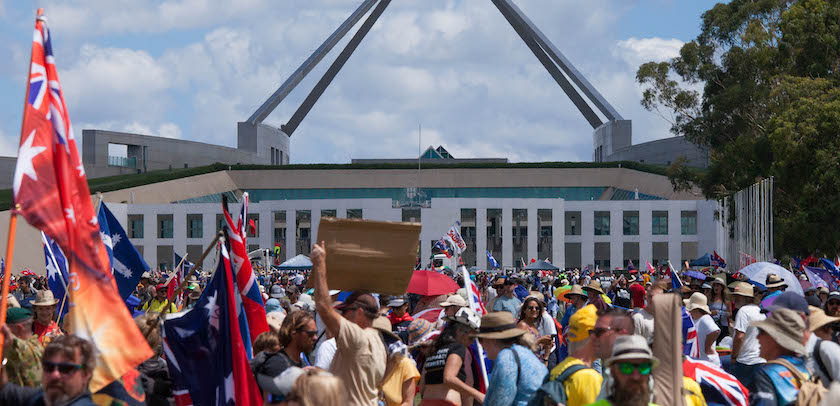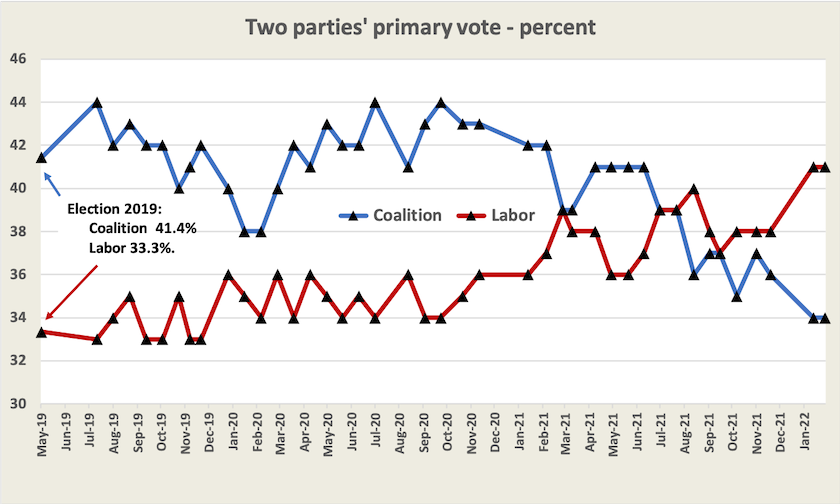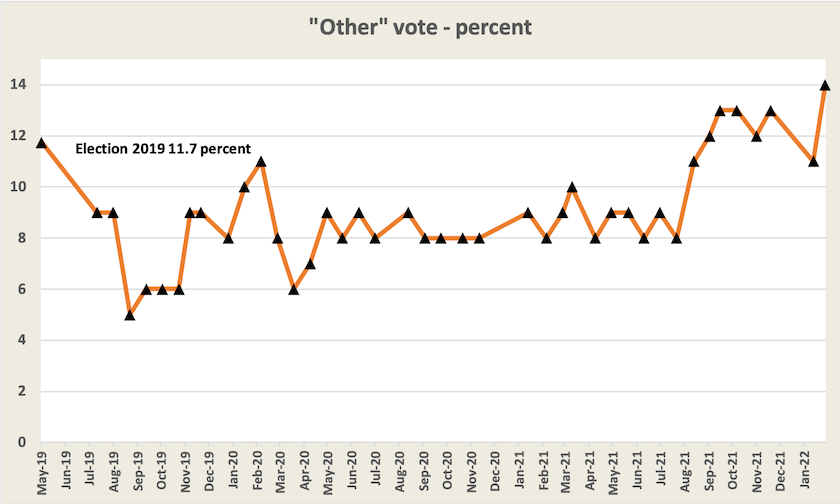Politics in our undignified election campaign
Is Putin’s Russia the source of dark money financing the Liberals’ campaign?
Russia has a track record in supporting conservative parties in western countries. There is strong evidence that Russia interfered in the 2016 US election campaign to support Trump, and that Russia was enthusiastic about Boris Johnson’s campaign to take the UK out of the European Union. There is every reason therefore to believe that Russian interests are behind undisclosed money flowing into the Liberals’ campaign.
That’s how easy it is to concoct a piece of conspiratorial bullshit, as Morrison and Dutton have done in alleging that Labor is under the influence of Chinese interests.
When a prime minister and a defence minister, desperate to be re-elected, deliver such rubbish from the nation’s most important law-making institution, it has serious consequences for our national security.
On Wednesday’s 730 Report, in a no-nonsense interview with Leigh Sales, ASIO’s Director-General Mike Burgess spoke about the ways foreign governments try to influence elections in Australia – no party is exempt from attempts – and how intelligence and law enforcement agencies protect our political systems against those threats. Unsurprisingly he confirmed that ASIO has no concern with any Labor candidates. The weaponization of security and foreign relations is not helpful for our security or for our democracy. (9 minutes).
Burgess’s predecessor, Dennis Richardson, speaking on ABC Breakfast was more direct. Commenting on Morrison’s assertion that there is disagreement between the government and opposition on security, he said: “the creation, or the attempt to create an artificial division where one in practice does not exist, only serves the interest of one country and that’s China”. (7 minutes)
As David Speers writes, summarizing Burgess’s presentation, with a dangerous China scare campaign, Scott Morrison seems willing to roll the dice on Australia's national interest.
(Perhaps the only redeeming aspect of this idiocy is that few people, in Australia or overseas, believe anything Morrison says.)
10 000 protesters in Canberra: who are they and what do they want?

Police estimate that 10 000 protesters assembled in front of Parliament House last Saturday. Apart from a few dressed in para-military outfits, and a handful of skinheads, it was a crowd of Australians one may have come across in 1960, while White Australia was still in force.
The ABC’s Media Watch has a take on the protests, noting that the group was heterogeneous, and included some who were “batshit crazy”. Included among the demonstrators were some who have become unemployed as a result of their refusal to be vaccinated. They were generally united around an anti-vaccination theme.
The anti-vaccination message wasn’t the only issue. Josh Rose, writing in The Conversation – How ‘freedom rally’ protesters and populist right-wing politics may play a role in the federal election – identified several groups and interests, including “Q-Anon conspiracy theorists, militant wellness groups, religiously inspired actors and far-right extremists such as the Proud Boys”. There were also groups affiliated with far-right American movements who use the term “Christian” as a trademark. (Their moral framework valorising selfish individualism has little connection with the moral theology of the Christian New Testament.)
Rose noted the presence of Ustaše flags, and the red ensign of the “sovereign citizen” movement. As the cover picture this week shows there was a hotchpotch of symbolism, the most common element being flags incorporating the UK flag (the Union Jack), suggesting affinity with far-right monarchist groups.
Other foreign-based groups, including Q’Anon and the Proud Boys, were there: in part this was a multinational venture. It takes organization to bring 10 000 people together, many travelling a long way. Rose points out that the modern far right is well-organized, with strong international affiliations.
As to what they want, Rose sums it up: “The prize is seats in parliament and the potential to hold the balance of power, forcing major parties to negotiate favourable outcomes for mining magnate Clive Palmer, via the United Australia Party”.
Perhaps they’re working against their own interests, however. When they forced the closure of one of Canberra’s major charity fundraising events, and kept clogging main thoroughfares, they didn’t endear themselves or their cause to the local population, as ABC Canberra journalist Adam Shirley points out. The ACT has two senators, one Labor, the other Liberal from the right faction of his party, who is facing a contest from strong independents. A bunch of right-wing yahoos harassing people going to a charity event won’t help his re-election. It’s similar to the damage inflicted on the Labor Party in 2019 when a supposedly “green” convoy drove into mining regions and upset local mining communities.
Rose reminds us that when the same groups assembled in Canada’s capital, the Ottawa chief of police described them as a “threat to democracy”. There has been no such admonition here, however, as the prime minister and defence minister busily conjure up stories of the Labor Party being influenced by the Chinese government.
As pointed out in the previous article, those allegations are absurd and dangerous. The Coalition, itself inclined to prioritise UK interests over Australian interests, has failed to warn that many in this mob are manipulated by foreigners who don’t have Australia’s interests in mind.
It is reasonable that the prime minister should acknowledge that the demonstrators have grievances, but Morrison essentially endorsed their anti-vaccination push, when he sheeted the “blame” for vaccination mandates to state governments, asserting that the Commonwealth supports only a restricted set of mandates. The Liberal Party has always harvested votes from the far right. This time it has gone one step further, in seeking support from far-right groups manipulated by foreign movements.
One of our readers has brought to our attention this YouTube video Day of Rage: How Trump Supporters Took the U.S. Capitol, pointing out some similarities with the mob in Canberra. The demographic is much the same and many of the symbols, particularly the use of flags (Confederate flag, Eureka flag) are similar, and some groups such as the Proud Boys appear on both occasions. One difference is that in Canberra the police found only one demonstrator with a loaded firearm.
Class in Australia
Weren’t we supposed to be the “classless society” in Australia?
Although we don’t refer to it specifically, class haunts our public conversations. We don’t have the traditional class distinctions defined by income or wealth, but there are class divisions based on culture, manifest in matters of taste, mannerisms and use of language. We know what sort a car a “bogan” will own and what will be a “hipster’s” preferred alcoholic drink.
On last weekend’s Saturday Extra Geraldine Doogue interviewed Steve Threadgold of the University of Newcastle on the question Does Australia have a class problem?. We tend to be blind to class, and therefore to the fact that economic disadvantage explains much about people’s behaviour. Economic disadvantage can also explain what the well-off and the well-educated consider to be people’s poor personal choices. Education is our great divide: people tend to herd around people with the same education background, and feel uncomfortable in the company of people with different education.
Threadgold finds that the pandemic has brought class inequalities into relief, because the pressure to keep the economy moving, in spite of the risk and inconvenience imposed by Covid-19, has fallen on to poorly-paid workers, while the well-off have carried far less of the burden. (17 minutes)
Threadgold is co-editor, with Jessica Gerrard, of Class in Australia
Yet another case of political corruption in a discretionary grants program
By now the Australian National Audit Office must have a standard template when it reports on Commonwealth discretionary grants programs.
This time it’s the Safer Communities Fund, established in 2016, under which the Commonwealth has disbursed $170 million, that has come to the ANO’s attention. Its main finding is that:
Funding decisions were not appropriately informed by departmental briefings and, for the majority of decisions, the basis for the decisions was not clearly recorded.
and
The decision-making records outline that certain applications were approved for funding on a basis other than the department’s assessment against the published merit criteria.
Tellingly it found that allocations became less well administered in 2017 when responsibility passed to the Minister for Home Affairs.
The ABC’s Henry Belot summarizes the ANO report, and covers Minister Dutton’s appearance at the Senate Estimates Committee, where senators quizzed him about his approving two grants that failed to meet the program’s eligibility criteria at the time of the 2018 Braddon by-election: Audit office accuses another federal grant program of favouring Coalition-held seats.
What the ANAO does not cover is the justification for federal government involvement in such projects. The projects have merit on public-good grounds, but surely they should be administered by adequately-funded state governments. The ANAO’s responsibilities do not extend into the general question of the Commonwealth’s involvement in discretionary programs that have no reason to be micromanaged by the national government. The only raison d’être for such programs is to be found in electoral politics.
On the ABC website journalist Bruce Mackenzie has an article Does pork-barrelling actually change the way people vote?. He describes situations where pork-barrelling has spectacularly failed: people generally take the money and vote as they please.
Because there are so many factors influencing people’s vote, determining the effectiveness of pork-barrelling is hard territory for researchers. They find that pork-barrelling tends to be concentrated in marginal seats, but there is little evidence of its political effectiveness. It seems to count, however, in party pre-selections, enhancing the nomination chances for an incumbent who has secured boondoggles for his or her electorate.
News for the media: independents don’t belong to political parties
On Wednesday Simon Holmes a Court spoke to the National Press Club about the work of Climate 200 in supporting independent candidates.
His 35-minute address started with his assessment of the situation that has led so many community-based independents to run for election:
Australians are generally a positive people. Yet engaged Australians are deeply frustrated that we’re not making progress on issues that matter. We are frustrated that so often our government is found to be either lying, or incompetent or sometimes both. We have a government more interested in winning elections than in improving the nation. We have a government that seeks power without purpose.
He went on to describe specific policy failures, particularly regarding climate change. He showed how the Morrison government has misled the community on its climate change efforts: it has cut back previously-announced budgetary commitments; has spread those same amounts over more and more years; has underspent appropriated funds; and has spent climate change funds on greenwashing projects.
He spoke about the values that candidates, financially supported through Climate 200, have in common:
- a science-based response to climate change
- ending corruption in politics
- real progress on gender equity and the safety of women
The 30 minutes of questions following his address confirmed his belief that most journalists don’t understand Climate 200’s model, or indeed how community-based independents operate in the political system. As he says, journalists are conditioned to seeing politics through the lens of a contest between political parties, not the wishes of communities represented by independents. Climate 200 is not a political party, it does not choose candidates, it does not issue party lines and talking points, and it does not have a platform.
On this last point journalists seemed to be flummoxed by these candidates being guided by a set of values, rather than a set of firm commitments: they are so used to the politics of parties having firm “positions” on issues.
Some journalists asked Holmes a Court how Climate 200 would direct successful candidates if they came to be involved in negotiations about who would form government. He made it clear, once again, that Climate 200 is not a party and that it does not direct anyone.
The same journalists seemed to want him to out himself as a Labor stooge. He is indeed critical of the current government and that’s a Coalition government, not a Labor government. He would be no less critical of a Labor government if it had enacted the same irresponsible policies. His general criticism is of the two-party system.
He also defended Climate 200’s limited disclosure of donations. It is more than compliant with current funding regulations, but has not applied the standards it advocates (immediate disclosure of all donations >$1000) in its own reporting of donations. Many people don’t want their donations to Climate 200 to be identified, because the present government is vindictive and vengeful towards those it considers to be its critics. A fairer system, where all would disclose their donations to all parties, would make people more comfortable in donating to those who are critical of the government.
You can donate through Climate 200’s website, or also directly to specific candidates.
Newspoll: strong support for independents
Last week I showed a comparison of opinion poll results, revealing a range of support for the two main parties, and confidently dismissed the January 30 Newspoll finding of 41 percent primary support for Labor as an outlier. The February 14 Newspoll (see William Bowe’s Poll Bludger) shows the same primary support for the two main parties as its January poll. Statistically, when figures are the same in two successive polls, they are more reliable.

A less-reported feature in successive Newspolls was a leap in support for “others” (other than the Labor, the Coalition and the Greens) six months ago, that has been maintained ever since. Perhaps some of this has been at the expense of the Greens, whose support has been drifting downwards. Is it possible that voters see in independents their best bet for dealing with climate change?

New South Wales by-elections – 4 elections, 4 surprises
Last weekend there were four by-elections in New South Wales. They seem to have rattled the state government which already lacks a majority in the Legislative Assembly. It wasn’t so much the loss of one more seat, as the size and nature of the swings that took the government by surprise.
In Strathfield, an inner-west Sydney electorate, Labor held on, with hardly any change in the vote after preferences were distributed. It was a case of a well-known member, former opposition leader Jodi McKay, retiring. If there was a usual anti-government by-election swing it was probably offset by the loss of McKay’s personal vote. But the truly surprising result was a 9 percent vote for independent candidate for the author Elizabeth Farrelly, who knocked a little off every other candidate’s primary vote.
In Monaro, a state electorate covering roughly the western half of the federal Eden Monaro electorate, the Nationals held on, with a 7 percent swing against them after preferences. That’s hardly surprising for a by-election, and it’s an electorate which is slowly losing its rural identity as it is being populated by people who work in Canberra and live in Queanbeyan and villages surrounding the ACT.
In Bega, which covers the state’s far-south coast and its hinterland, there was a 13 percent swing to Labor both on primary vote and after preferences, resulting in this seat, long held by the Liberals, changing hands. In part this may be explained by the resignation of former Minister Andrew Constance, who had a good reputation in his portfolios and was popular locally. Also this area was badly ravaged by the 2019-20 fires, and it was in Cobargo where Morrison received a hostile reception when he visited after the fires. We might recall his gauche forced handshake inflicted on a distressed lady.
The biggest upset was in Willoughby, a prosperous inner north Sydney seat, vacated by the retirement of former premier Gladys Berejiklian and considered to be blue ribbon Liberal. Labor didn’t contest the seat, but the Liberal candidate suffered a 14 percent swing against him – 19 percent after preferences – from an independent who didn’t run a particularly strong campaign. As at the time of writing (Friday morning) the Liberals are just ahead by 1.7 percent.
Full and up-to-date counts for all four by-elections are on Antony Green’s website.
Adrian Beaumont, writing in The Conversation, believes that these results do not imply that voters are in a “baseball bat” mood, and that they have little implication for federal politics. But it’s hard to ignore the strong swing to independents. Also the performance of Greens candidates in all electorates was underwhelming. Maybe the state government’s strong policies on renewable energy, in contrast to the Commonwealth’s pathetic approach, may have something to do with the Greens’ failure to make much headway.
Death of a conservative
Give war a chance was the unforgettable title of a 1992 book by conservative and libertarian satirist P J O’Rourke, who died on Tuesday. The New York Times has a short account of his political life in an obituary.
His often-outrageous quips against liberals and the left may not have converted anyone, but they demonstrated that no political movement has a monopoly on hypocrisy, and they helped people confront their own values and assumptions.
With humour he was able to contribute to conservative thought in a way that contrasts with Morrison’s vituperative and ill-mannered behaviour. It is extraordinary that Morrison’s wife, Jenny Morrison, can criticize Grace Tame for not showing “manners and respect” for her husband, when he stands in Parliament and behaves with manners that would have him thrown out of a shearer’s pub and absolute disrespect for our most basic democratic institution.